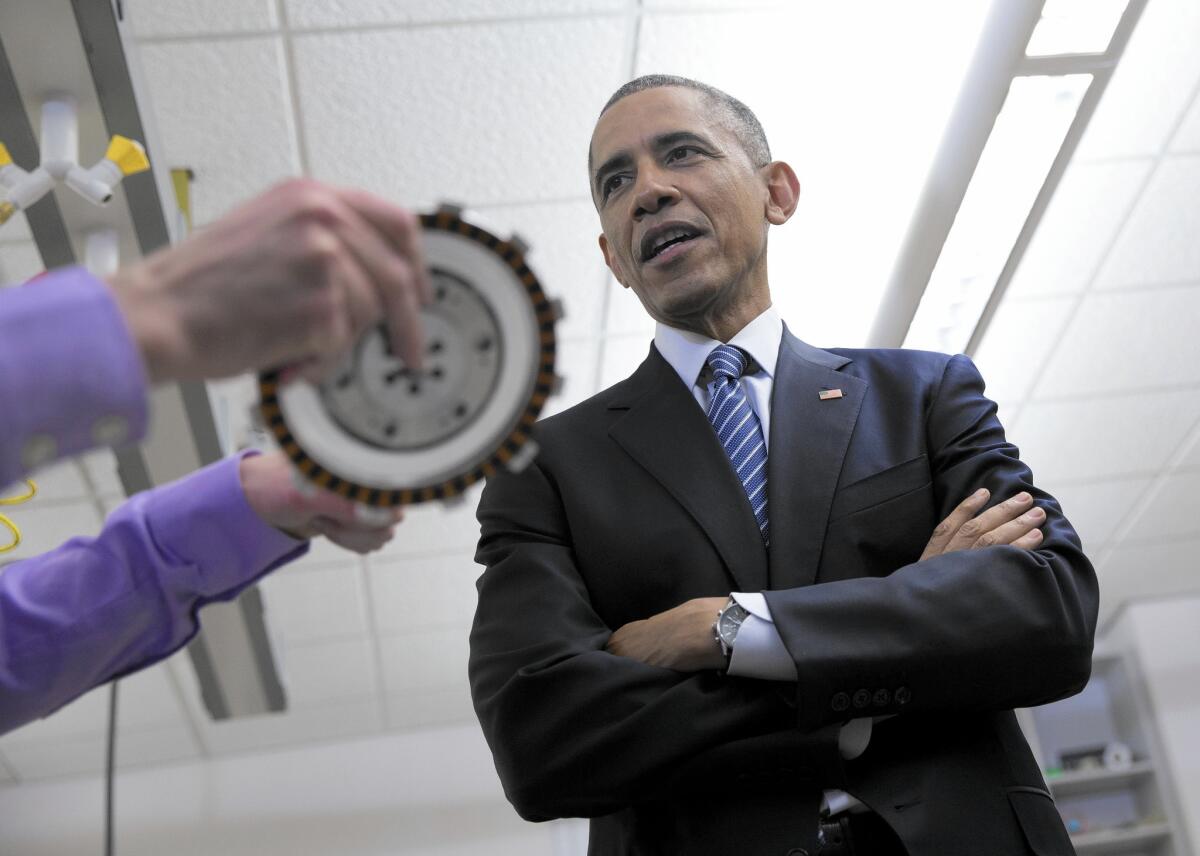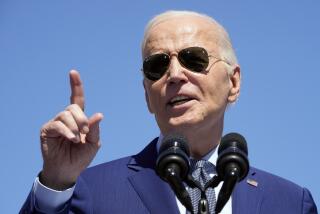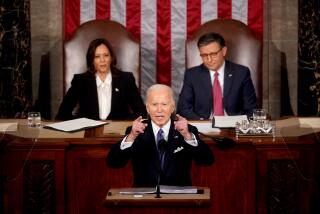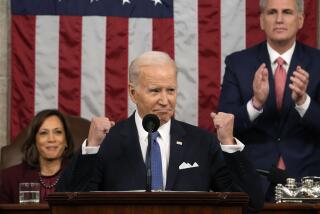Obama downsizes his policy aims — and challenges Congress to answer

There was no reference to the electoral drubbing his party suffered last fall, nor a deferential tribute to the new Republican Senate majority leader. The only elections that a self-assured President Obama mentioned in his State of the Union address were his own victories.
Yet for all his confidence, the initiatives the president outlined were mostly small-bore, or have little chance of becoming law in the face of congressional opposition.
Such relatively modest proposals represent a shift by the White House away from swinging for the fences to a more methodical approach to policymaking. Having spent much of his first six years in office expending significant political capital on heavy-lift initiatives like the Affordable Care Act, the president instead presented more digestible ideas meant to help extend the benefits of the growing economy to the middle class.
Obama ditched Washington on Wednesday for Idaho to make his case directly to a public seemingly more receptive to his message of late. He has taken short tours across the country over the last two weeks in an unusual, steady-drip buildup to the State of the Union in which the White House announced new initiatives ahead of time, rather than saving them for the speech.
“If we do these things, it’ll make our economy stronger, not just a year from now or 10 years from now, but deep into the next century,” Obama told a boisterous crowd of nearly 7,000 at Boise State University.
Obama tied together his plans, which included free community college education, an effort to boost home ownership and extend paid leave for more Americans, under the banner of what he called “middle-class economics.”
Since riding to the White House six years ago on the single-word platform of “change,” Obama has found it difficult to sustain political momentum amid myriad unforeseen challenges that complicate plans to advance his agenda.
Often, the Obama White House has tried to reset the debate on favorable terms with a big speech, whether it be special addresses to Congress on his faltering healthcare plan in 2009 or the still-struggling economy in 2011. Just last fall, he opted for a prime-time national address on the threat posed by Islamic State militants after criticism over his uneven response to the extremist group.
But Tuesday’s speech was more an exclamation point on a two-week-long sentence.
Between the relatively modest proposals and the tactics to sell them, Obama’s once-skeptical Democratic allies now say he has succeeded in forcing new Republican majorities on their heels and depriving them of an opportunity to build political momentum of their own.
“He’s changed the debate,” forcing the GOP to explain whether slashing corporate taxes should take priority over boosting stagnant wages, said Democratic Sen. Sherrod Brown of Ohio.
“These are points Democrats have wanted to hear for some time,” said Democratic Rep. Adam B. Schiff of Burbank. “Touting some of the economic successes we’ve achieved, and setting out the distance yet to go.”
On Wednesday, Obama took aim at a small piece of another major agenda item: climate change. He ordered the creation of a committee to advise the federal government on issues related to the Arctic, particularly global warming.
“The United States has a responsibility to strengthen international cooperation in the Arctic, mitigate the greenhouse gas emissions driving climate change ... and serve as stewards for valuable and vulnerable ecosystems,” the White House said.
Breaking out each proposal separately brings more attention to the initiatives and challenges Republicans to say whether they can do better, the administration said.
“My job is to put forward what I think is best for America. The job of Congress is to put forward alternative ideas. But they have to be specific; it can’t just be no,” Obama said in Boise.
Republican leaders began the new session of Congress not with an ambitious agenda of new ideas, but with efforts to resurrect a series of bills they say would create jobs that had passed the House before but were blocked by the Senate when Democrats were in charge, such as building the controversial Keystone XL pipeline. The idea was to test the president’s willingness to veto ideas passed with bipartisan support, aiming to portray him as a roadblock to new economic ideas.
The new GOP-led Senate has been considering the Keystone bill for more than two weeks. The House has passed its Keystone legislation and a short-term Homeland Security Department spending bill designed to undo Obama’s recent executive actions on immigration. This week, the House turns to a measure that would ban abortions after the 20th week of pregnancy.
“I don’t find that to be a particularly persuasive or compelling vision for the country,” White House Press Secretary Josh Earnest said.
He said he expected the GOP eventually to “more clearly articulate what it is that Congress can do to help middle-class families.”
Kathleen Hennessey in the Washington bureau contributed to this report.
More to Read
Get the L.A. Times Politics newsletter
Deeply reported insights into legislation, politics and policy from Sacramento, Washington and beyond. In your inbox three times per week.
You may occasionally receive promotional content from the Los Angeles Times.







